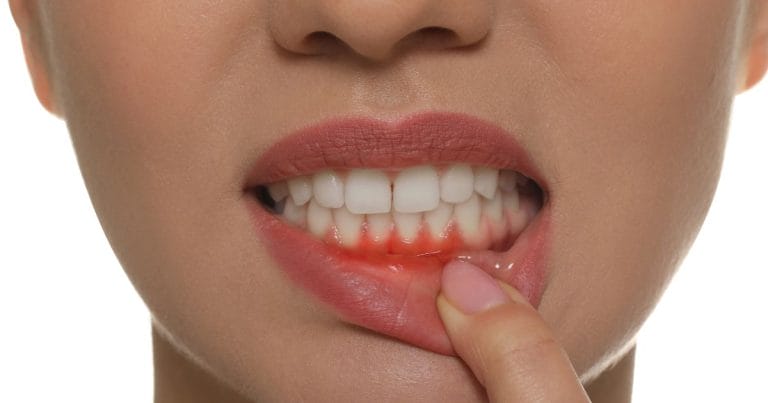Oral health and regular dental care are critical components of overall well-being. Bleeding gums while flossing frequently causes concern and raises questions about its causes and solutions. This blog post will address these concerns by providing information on understanding bleeding gums while flossing. It begins by emphasizing the importance of good oral health and regular dental care. It then delves into common concerns about bleeding gums while flossing, dispelling myths, and clarifying when it should be cause for concern. The post also discusses proper flossing techniques, home remedies, and when professional dental care may be required to manage and prevent bleeding gums. By the end, readers will have a thorough understanding of the subject. They will have the knowledge and tools to confidently address bleeding gums while flossing, promoting oral health and overall well-being.
And of course, if you have additional questions regarding your oral health or oral care routine, contact your local dentist for more information.
Understanding the Basics of Gum Health
Several factors influence gum health, including genetics, oral hygiene habits, and overall health. While genetics determine the thickness and shape of the gums, oral hygiene practices play a significant role in keeping them healthy. Regular brushing, flossing, and routine dental check-ups are essential to prevent gum disease.
Recognizing the signs of healthy gums is crucial for identifying potential issues. Healthy gums are typically pale pink in color, firm, and snugly fit around the teeth. They do not bleed during brushing or flossing and have a stippled texture like an orange peel. Moreover, healthy gums should not exhibit swelling, tenderness, or receding from the teeth.
Individuals can take proactive measures to maintain their oral well-being by understanding the basics of gum health. Implementing proper oral hygiene practices, being mindful of genetic predispositions, and recognizing the signs of healthy gums are essential steps toward achieving and preserving optimal gum health. Regular dental care and consultation with a dental professional, as recommended by the American Dental Association (ADA), are essential to address any concerns and ensure the long-term health of the gums.
Why Do Gums Bleed During Flossing?
Gums can bleed during flossing due to various factors, and understanding the underlying causes is crucial for addressing this issue effectively. One primary cause is the buildup of plaque and tartar along the gumline. When plaque is not adequately removed through regular brushing and flossing, it can irritate the gums, leading to inflammation and bleeding. Gingivitis is another common cause of bleeding gums, the early stage of gum disease. Gingivitis occurs when plaque buildup and bacteria cause the gums to become inflamed, leading to bleeding during flossing.
Poor or aggressive flossing techniques can also contribute to gum irritation and bleeding. It’s important to use proper flossing techniques, such as gently sliding the floss between the teeth and forming a C-shape around each tooth. Beyond that, other potential causes of bleeding gums during flossing include hormonal changes, medications that affect blood clotting, or systemic conditions like diabetes or leukemia. If bleeding gums persist despite practicing good oral hygiene, it’s advisable to consult a dental professional to identify and address any underlying issues.
Differentiating Between Normal and Abnormal Bleeding
When it comes to bleeding gums, it’s important to differentiate between occasional, mild bleeding and persistent or excessive bleeding. Occasional, mild bleeding during brushing or flossing can be relatively common and may not necessarily indicate a severe problem. Factors to consider when determining the severity of bleeding include the frequency, duration, and amount of blood observed. Mild bleeding that stops quickly and occurs infrequently is generally less concerning. However, if bleeding persists, becomes excessive, or is accompanied by other pertaining to symptoms like gum swelling or pain, it is crucial to seek a professional dental evaluation.
Knowing when to consult a dental professional for evaluation and treatment is essential for optimal gum health. It is recommended to seek professional care if bleeding gums persist for more than a week, occurs spontaneously without provocation, or if there is a significant increase in severity. Additionally, a dental visit is warranted if other symptoms like persistent bad breath, loose teeth, or receding gums accompany bleeding gums. Dental professionals have the expertise to identify and address underlying causes of bleeding gums, such as gum disease or oral infections. Prompt evaluation and treatment can help prevent further complications and ensure the long-term health of your gums and overall oral well-being.
Tips for Flossing Effectively and Safely
Flossing effectively and safely is crucial for maintaining optimal oral hygiene. To ensure success, choosing the right floss type that suits individual needs is important. Options include traditional floss, floss picks, or water flosses. The proper flossing technique is critical, and it involves gently sliding the floss between each tooth and making a C-shape around the tooth to clean both sides. It’s important to avoid common mistakes such as snapping the floss or using excessive force, as these can irritate the gums and lead to bleeding.
Supplementing flossing with other oral hygiene practices can further enhance oral health. Mouthwash can be used after flossing to rinse away bacteria and freshen your breath. Interdental brushes can also be used alongside flossing to clean hard-to-reach areas between teeth. These tiny brushes are effective in removing plaque and debris from interdental spaces.
Consistency is key; flossing should be done at least once daily to maintain oral hygiene. Individuals can effectively and safely remove plaque and maintain gum health by choosing the right floss, utilizing the proper technique, and complementing flossing with other oral hygiene practices. Regular dental check-ups and consultations with a dental professional are also recommended to ensure good oral care and address any concerns or questions related to flossing.
Steps to Improve Gum Health and Prevent Bleeding
Improving gum health and preventing bleeding gums requires a multi-faceted approach encompassing several steps. First and foremost, maintaining a consistent oral hygiene routine is crucial. This includes brushing teeth at least twice daily with a soft-bristled toothbrush and using proper flossing techniques to remove plaque and debris between the teeth. Regular dental check-ups and professional cleanings are also vital for gum health. Dentists can identify and address any underlying issues, remove hardened plaque (tartar), and provide guidance on proper oral care. Remember, oral health has an impact on the entire body, so keep to a routine!
In addition to oral hygiene practices, making dietary and lifestyle changes can support gum health. A balanced diet rich in fruits, vegetables, and whole grains provides essential nutrients for gum health. Avoiding sugary and acidic foods and beverages can help prevent gum disease. Furthermore, lifestyle factors such as quitting smoking and reducing alcohol consumption can significantly improve gum health.
Stress management also plays a role in maintaining healthy gums. Chronic stress can weaken the immune system and increase the risk of gum disease. Stress-reducing activities like exercise, meditation, or hobbies can help manage stress levels and promote gum health.
Seeking Professional Help for Persistent Bleeding
When persistent bleeding occurs despite maintaining proper oral hygiene habits, seeking professional help is crucial. Persistent bleeding may be a sign of an underlying issue that requires specialized treatment. Dental professionals can conduct a thorough examination to determine the cause of the bleeding and develop an appropriate treatment plan. In cases where gum disease is the root cause, professional treatments such as scaling and root planning may be necessary to remove plaque and tartar buildup and restore gum health. Additionally, dental professionals can address any other oral health concerns contributing to the bleeding, such as cavities or infected gums.
Early detection and intervention are of utmost importance for gum health. By seeking professional help promptly, individuals can prevent further progression of gum disease and mitigate potential complications. Early intervention helps resolve the issue at hand, promotes overall oral health, and prevents the development of more severe oral conditions. Regular dental check-ups are essential for early detection, as dental professionals can identify and address any signs of gum disease or other oral health problems. By partnering with a dental professional, individuals can receive the necessary care and guidance to manage persistent bleeding effectively and maintain optimal gum health in the long run.
Conclusion
In conclusion, understanding the importance of oral health, the causes of bleeding gums, and effective flossing techniques are key to maintaining optimal gum health. By implementing consistent oral hygiene practices, seeking professional help, and making lifestyle changes to support gum health, individuals can prevent bleeding gums, promote overall oral well-being, and enjoy a healthy smile for years.



